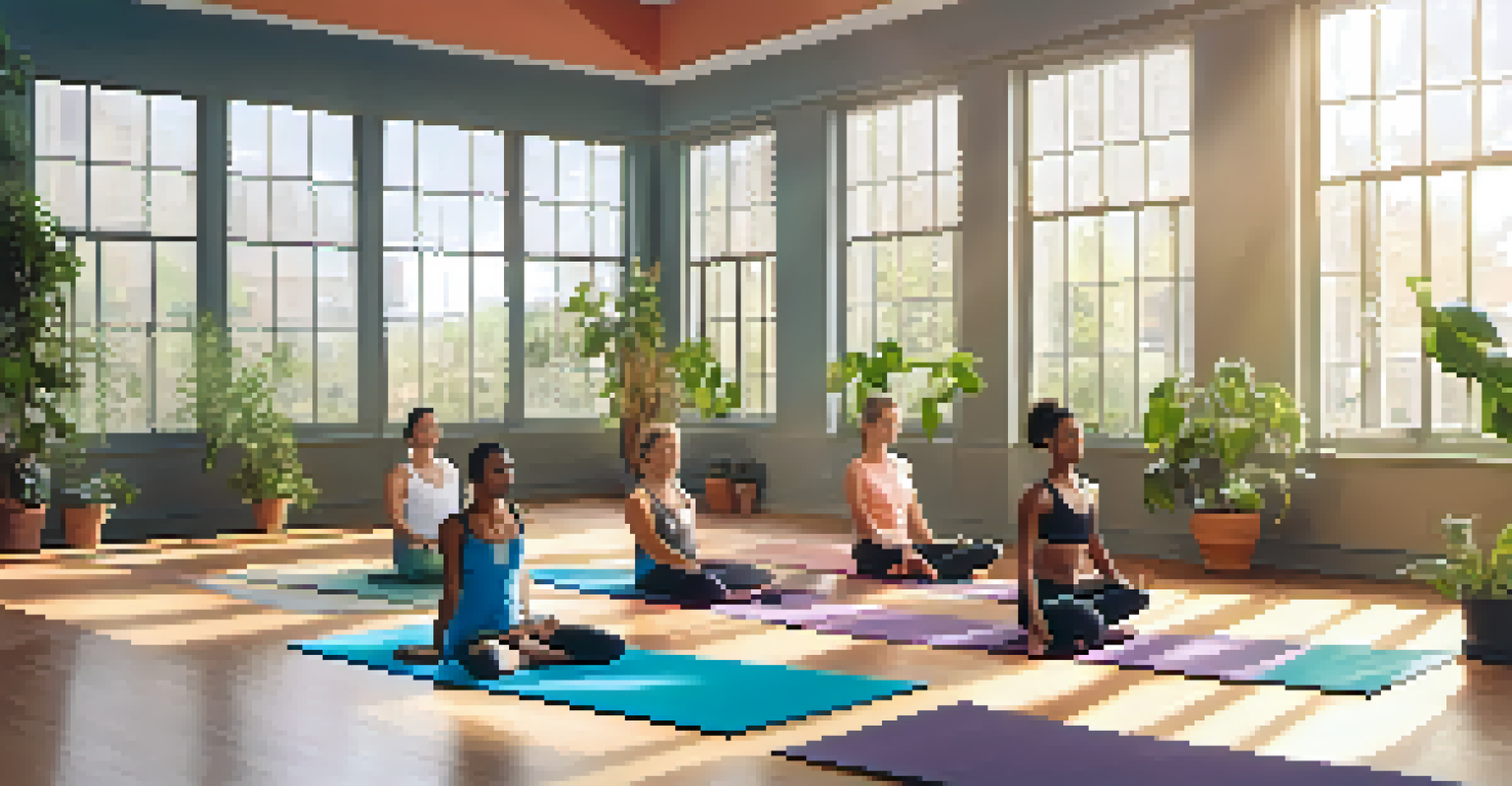Mindfulness Practices to Enhance Personal Flexibility

Understanding Mindfulness and Its Benefits
Mindfulness is the practice of being fully present in the moment. It encourages awareness of your thoughts, feelings, and surroundings without judgment. By engaging in mindfulness, you can create a mental space that promotes flexibility, allowing you to adapt more easily to life's challenges.
Mindfulness isn’t difficult. What’s difficult is to remember to be mindful.
The benefits of mindfulness extend beyond stress reduction; it enhances emotional regulation and improves focus. Imagine standing at a fork in the road, and mindfulness helps you weigh your options without panic. This clarity can lead to better decision-making and an increased ability to navigate uncertainty.
Moreover, cultivating mindfulness fosters resilience, enabling you to bounce back from setbacks. When you practice being present, you learn to approach obstacles with curiosity rather than fear, which is essential for developing personal flexibility.
Breath Awareness as a Flexibility Tool
One of the simplest yet most effective mindfulness practices is breath awareness. Focusing on your breath helps anchor you to the present moment, creating a sense of calm that promotes flexible thinking. When you notice your breath, you can also observe your thoughts as they come and go, which can lessen their intensity.

For instance, when faced with a stressful situation, taking a few deep breaths can provide clarity. This pause allows you to respond thoughtfully rather than react impulsively. As you breathe, visualize your worries flowing out with each exhale, making space for more adaptive responses.
Mindfulness Enhances Flexibility
Practicing mindfulness fosters emotional regulation and resilience, allowing you to adapt better to life's challenges.
Incorporating breath awareness into your daily routine can transform your approach to challenges. Whether it's during a hectic workday or a personal dilemma, returning to your breath can empower you to maintain your composure and adapt to changing circumstances.
Mindful Movement: Yoga and Flexibility
Mindful movement practices like yoga can significantly enhance your personal flexibility. Yoga encourages you to connect with your body while simultaneously calming your mind. As you flow through poses, you learn to listen to your body’s needs, fostering adaptability both physically and mentally.
The greatest discovery of my generation is that a human being can alter his life by altering his attitudes.
For example, a simple yoga pose like Downward Dog requires you to adjust your body to find balance and comfort. This physical practice mirrors life’s demands, where flexibility and adjustment are necessary for success. Each time you practice, you reinforce your ability to pivot in various situations.
In addition, yoga promotes a sense of community and support, which can encourage you to step outside your comfort zone. Being part of a class can remind you that flexibility isn’t just about how you move; it’s also about how you engage with others and embrace new experiences.
Meditation: Cultivating Mental Agility
Meditation is a powerful tool for developing mental agility, allowing you to navigate life’s changes with ease. By practicing meditation, you train your mind to focus and let go of distractions. This mental clarity can help you adapt your thoughts and reactions to various situations.
Consider this: when you meditate, you may encounter racing thoughts. Instead of resisting them, mindfulness teaches you to acknowledge and release those thoughts. This practice of acceptance can translate into real-life scenarios, enabling you to face challenges without being overwhelmed.
Breath Awareness for Calmness
Focusing on your breath anchors you in the present, providing clarity and enabling more thoughtful responses to stress.
Regular meditation can create a sense of inner peace, making it easier to manage stress and uncertainty. As you cultivate this mental space, you’ll find that flexibility becomes a natural response, allowing you to approach life with an open heart and mind.
Journaling for Reflection and Growth
Journaling is another effective mindfulness practice that can enhance personal flexibility. Writing about your thoughts and feelings provides a safe outlet for self-expression. This reflection can help you identify patterns in your behavior and thought processes that may need adjustment.
For instance, after a challenging day, journaling can help you process your experiences and recognize what you might do differently next time. This practice encourages a growth mindset, allowing you to view setbacks as opportunities for learning rather than failures. By documenting your journey, you gain insights that enhance your adaptability.
Additionally, journaling can help you celebrate your successes, no matter how small. Acknowledging your progress fosters resilience, reminding you that you have the strength to adapt and grow through life’s many twists and turns.
Gratitude Practices to Shift Perspective
Practicing gratitude is a simple yet profound way to enhance your flexibility. When you take time to acknowledge what you’re thankful for, you shift your focus from obstacles to opportunities. This shift in perspective can help you embrace change rather than resist it.
For example, starting or ending your day by listing three things you’re grateful for can rewire your brain to notice the positives in life. This practice can create a more adaptable mindset, helping you navigate challenges with a sense of hope and possibility. It’s like putting on a pair of glasses that help you see the silver lining in every cloud.
Gratitude Shifts Your Perspective
Regularly practicing gratitude helps you see opportunities instead of obstacles, fostering a more adaptable mindset.
By incorporating gratitude into your daily routine, you cultivate a more positive outlook. This positivity can enhance your ability to respond to change with grace, making you more resilient in the face of life’s uncertainties.
Embracing Change Through Mindful Living
Embracing change is a core aspect of personal flexibility, and mindfulness can help you adapt to life’s inevitable transitions. By living mindfully, you become more attuned to the present moment, allowing you to respond to changes rather than resist them. This approach encourages a sense of flow in your life.
For instance, when faced with unexpected changes, practicing mindfulness can help you pause and assess the situation. Instead of reacting out of fear, you can approach the change with curiosity and openness. This shift in mindset can turn challenges into opportunities for growth.

Ultimately, mindful living encourages you to accept that change is a natural part of life. By cultivating this acceptance, you can navigate transitions with greater ease, enhancing your overall personal flexibility and resilience.
Integrating Mindfulness into Daily Life
To fully benefit from mindfulness practices, it’s essential to integrate them into your daily life. This doesn’t mean you need to set aside hours for formal practice; even small moments of mindfulness can make a big difference. Simple acts, like savoring your morning coffee or taking a mindful walk, can help you stay grounded.
Consider setting reminders throughout your day to pause and check in with yourself. These moments can serve as gentle nudges to practice awareness, whether through breath, gratitude, or simply noticing your surroundings. Over time, these small practices accumulate, significantly enhancing your personal flexibility.
Additionally, connecting with others who value mindfulness can further enrich your journey. Sharing experiences and techniques with like-minded individuals can provide motivation and support, creating a community that fosters growth and adaptability. Ultimately, integrating mindfulness into your life can transform your ability to embrace change and thrive.